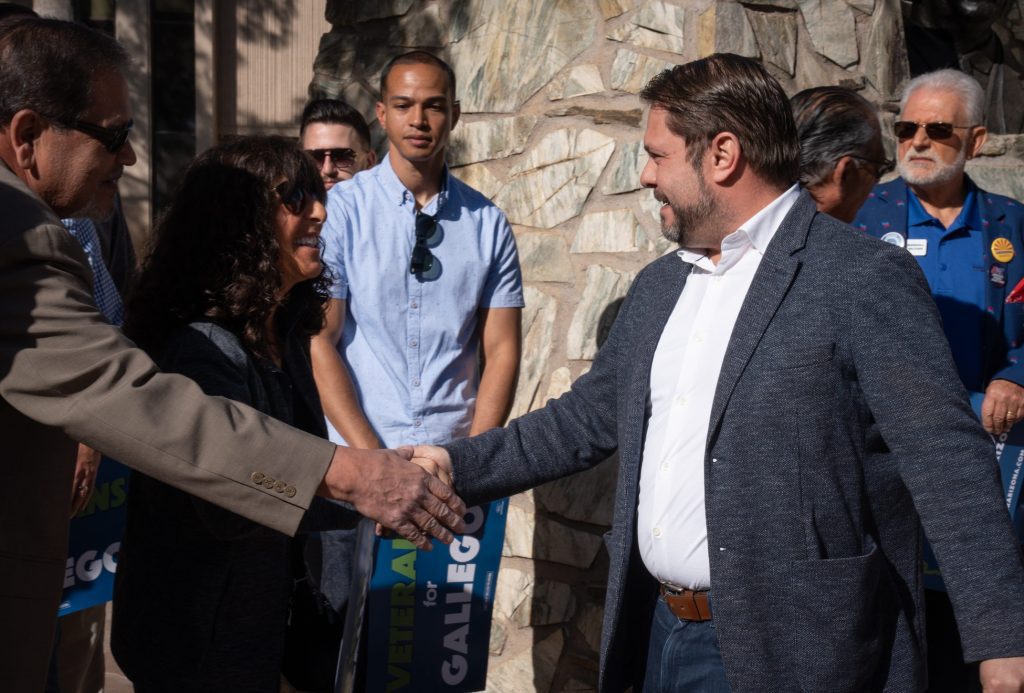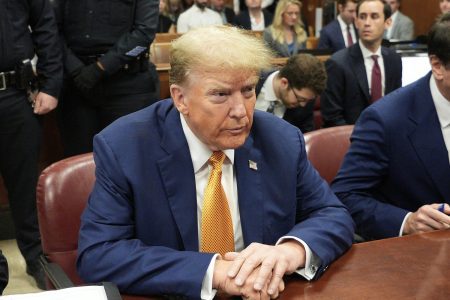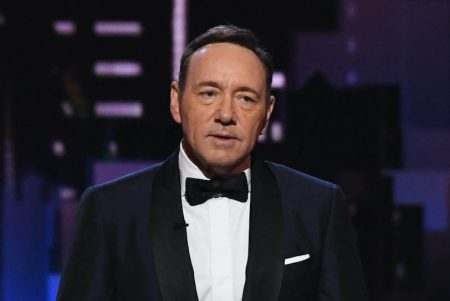On the afternoon of January 6, 2021, while election deniers armed with Tasers and tomahawks took over the US Capitol, Rep. Ruben Gallego (D-AZ) gave his colleague and close friend Eric Swalwell a pen. “Here,” he said to the California Democrat. “Stick this in their neck if they get close to you.”
The Marine veteran, who had experienced combat in Iraq, jumped on a table and began giving instructions to other panicked lawmakers, showing them how to wear the gas masks stored under their chairs: “Tear gas will not kill you. But it’s important to remain calm. If you hyperventilate, you may pass out.” If needed, Gallego thought, he could use his own pen as a weapon to take a more lethal one from a rioter.
Three years later, the fight for American democracy continues, and Gallego, engaged in one of the most decisive contests of the 2024 election, is once again trying to maintain the position. Along with close contests in Ohio and Montana, his Senate race in Arizona for the seat Kyrsten Sinema is leaving behind could be one of a few that determines control of the upper chamber and, with it, the future of our republic. Donald Trump, facing 88 criminal charges, has vowed to bring in MAGA on steroids if reelected, including mass deportation and broad bans on gender-affirming care. A Democratic-led Senate would be one of the last defenses against his agenda.
To further emphasize the stakes, Gallego’s rival is the former TV news anchor turned Trump loyalist Kari Lake. A prolific spreader of conspiracy theories, Lake asserts not only that the 2020 election was taken from Trump but also that she was cheated out of the Arizona governorship in her 2022 race. If Trumpism is similar to a religion, Lake sees herself as one of its victims. “You can call us extremists. You can call us domestic terrorists,” she stated during one campaign event in 2022. “You know who else was called a lot of names his whole life? Jesus.”
Lake’s defeat two years ago is just one sign that Arizona is moving away from Trump-style conservatism. Though Trump won the state by 3.6 percent in 2016, he lost it in 2020 by about half of a percent. In 2022, all of the major statewide candidates Trump supported were defeated. But the state is certainly not a Democratic stronghold, either. Of about 4.1 million registered voters, there are some 236,000 more Republicans and 197,000 more independents than there are Democrats. To win, Gallego “has to appeal to a cross section of voters,” says former Arizona Democratic Party Chair Jim Pederson, “particularly moderate Republicans.”
To do this, Gallego will need to navigate a delicate line on the border crisis; the crisis raises drug and crime concerns for many Republican voters, but migrants also drive the state’s economy. The high-profile race will also require Gallego to address controversies from his past. The same wartime experiences that prepared him for January 6 left him with PTSD that has led to angry outbursts and the end of his first marriage while his then-wife was pregnant with their child.
Gallego's struggles with mental health might give his opponent a chance to use against him, but his supporters argue that his history of difficulties is not a weakness—it may even be a strength.
"I was on the floor with him on January 6. I was sitting right next to him," Swalwell explains. "And I saw, actually, not someone with a temper, but someone very much in control."
Gallego never dealt with easy circumstances. It wasn't easy for Gallego. Both of his parents came to the United States as teenagers, his father from Mexico and his mother from Colombia. His parents divorced when Gallego was in junior high. His now-estranged father, who worked in construction, would later be convicted on felony drug charges. His mother raised Gallego and his three sisters in a small apartment outside of Chicago, where Gallego slept on the living room floor and helped the family make ends meet through odd jobs as a line cook, a janitor, and a cashier. From his makeshift bedroom, he planned an escape from poverty through a college education. His dream school, Harvard, eventually offered him a scholarship.
In Cambridge, Gallego had a dorm room with a bed—something he hadn't had in six years. He studied international relations, thinking he might work for the State Department one day, and had some culture shock. "We both were finding our way in this new environment," says Shailesh Sahay, Gallego's fraternity brother and future best man, who is also the son of immigrants. "We both went to public high schools and kind of socialized in a normal public school way. In contrast, there were kids like Jared Kushner in school with us. His budget for going out on Saturday night was significantly higher than our budget."
But Gallego could socialize with anyone, friends say. "Was he the absolute coolest kid in class? No, but he definitely knew a lot of people," says Jean-Pierre Jacquet, another Harvard classmate and fraternity brother in Sigma Chi. He "had a lot of self-confidence, which is, you know, not unusual in Cambridge."
During his sophomore year, Gallego's college career was almost derailed after his grades dropped and he broke some campus rules. ("Underage drinking" was involved, he told the Boston Globe.) Harvard administrators expelled him, saying he could reapply in a year. A few months later, Gallego joined the Marine reservists and completed basic training in South Carolina. He was readmitted to Harvard for the winter 2001 semester. That autumn, Gallego watched as two hijacked planes struck the World Trade Center towers, altering the country's future and his own.In 2003, when Gallego would have been in his final semester at Harvard, his unit was sent to Okinawa, Japan, for an uneventful deployment. But the next one was different. After graduating from Harvard in 2004, Gallego moved to New Mexico with his college girlfriend, Kate Widland. He did fieldwork for John Kerry's presidential bid until he was called up again, this time to Iraq with a battalion that would send home 48 flag-draped caskets, more than any other since the 1983 Beirut bombing.
In 2003, during what would have been Gallego's last semester at Harvard, his unit was sent to Okinawa, Japan, for a quiet deployment. The next one wouldn't be. After graduating from Harvard in 2004, Gallego followed his college girlfriend, Kate Widland, to New Mexico. He did fieldwork for John Kerry's presidential campaign until he was called up again, this time to Iraq with a battalion that would send home 48 flag-draped caskets, more than any other since the 1983 Beirut bombing.
After spending six violent months in Iraq, Gallego moved to Phoenix, where Kate had relocated for work in Democratic politics. He says in his 2021 memoir that readjusting to 'normal' life was confusing. The goals were unclear, the relationships were less intense, and therefore less meaningful.
One of Gallego’s initial projects was fighting against a state ballot proposition that aimed to outlaw gay marriage. During this campaign, Gallego clashed with then–state Rep. Sinema, who was leading the proposition.
Gallego’s role involved recruiting volunteers, many of whom were members of the same LGBTQ community as Sinema, who is bisexual. Despite this, she believed it was a mistake to focus on queer people in the campaign. Instead, she wanted to emphasize how the proposition would also make it harder for straight and unmarried couples to access insurance and legal protections. After Gallego argued that she was pushing away their most effective advocates, Sinema eventually asked for his removal from the campaign. Yuhas sees it as a “personality conflict,” and adds that “neither one of them lacks in personality.”
Yuhas states that Sinema’s strategy was necessary, considering the conservative politics in the state at the time, and points out that Gallego excelled in other projects, including the successful campaign of Phoenix City Council Member Michael Nowakowski, who hired Gallego as his chief of staff.
Nowakowski and Gallego had an odd-couple relationship—Nowakowski, a soft-spoken manager of a Spanish-language radio station who once aspired to become a priest, and Gallego, a determined war veteran. “I want to throw down some hail and brimstone, and this guy’s like, ‘It’s not how I operate,’” Gallego told the Arizona Republic.
Gallego’s intense temperament caused a local scandal the following year when he strongly reprimanded a council intern, “yelling and pounding his desk,” according to the Arizona Republic. Less than an hour after the incident, Gallego emailed two city council staffers: “When you have a chance I would like to talk to you about [the aide],” he wrote. “Her time as an intern is up.” in 2008.
The intern claimed Gallego “was aggressive towards me” and filed two complaints with the city. She was let go shortly after. The city ultimately cleared Gallego of the harassment accusations and noted that the intern was previously slated to be dismissed due to budget cuts. Gallego addresses the incident in his memoir, attributing his behavior to trauma from his military service. “I’d never lost my cool before the war,” he writes. “Now I did, snapping and yelling at people for little reason.” RepublicGallego resigned from Nowakowski’s office in late 2009 to run for a state House seat representing a liberal portion of Phoenix. In this new role, he prioritized legislation that benefited fellow military service members, specifically a bipartisan bill granting veterans in-state tuition in Arizona. But soon he was looking for his next break, and after the US House member who represented his district announced his retirement, Gallego jumped into the race. After a competitive primary, Gallego easily won the general election.
Gallego’s struggles continued as he rose in the political ranks in DC. In his book, he writes that he still drank, smoked, and lost his temper more than he should have. He also experienced nightmares, thought about his deceased friends, and questioned why he was alive. He couldn't find anything to cheer him up.
The symptoms Gallego experienced are also listed by the Department of Veterans Affairs as part of the criteria for PTSD, which he was diagnosed with after three years of medical evaluations. By then, his marriage with Kate had fallen apart, and they announced their separation in 2016 when she was in the third trimester of her pregnancy. Now serving as the mayor of Phoenix, she and Gallego co-parent their 7-year-old son, who often accompanies his dad on the campaign trail. Despite the timing of their split being criticized by Gallego’s opponents, Kate endorsed her ex-husband’s Senate bid in December.
Mother Jones
Washington Free Beacon has filed a motion to unseal Gallego’s divorce records, and Lake has.) The attacked him over the issue. Referring to Gallego’s pro-choice views, she said she would 'not be lectured on motherhood' by someone who 'left his wife when she was nine months pregnant.' Gallego’s mental health challenges have also affected his work as a congressman. A former Arizona state lawmaker recalls a meeting shortly after Gallego arrived in Capitol Hill, where a veteran injured by an IED urged Gallego to oppose the Iran nuclear deal. According to the former lawmaker, Gallego became angry and started shouting in response to the veteran's aggressive lobbying. However, a congressional aide present in the room disputes that Gallego yelled, stating that he instead took a stern tone due to the veteran's confrontational approach. According to a former lawmaker, Gallego's occasionally blunt personality may contrast with the poised image of his opponent, especially in a debate. The former lawmaker points out that Lake, with her 30 years of television experience, can appear composed, while Gallego might come across as an angry man confronting a woman who is saying outrageous things.
Gallego’s allies claim that unlike his opponent, Lake, who conceals political disinformation and deceit behind a perfect appearance, Gallego is genuine. According to Swalwell, Gallego doesn't always display typical politician behavior, which is refreshing. When meeting new people in Washington, he expresses his honest opinions and is not afraid to disagree, without being impolite.
In mid-December
, Gallego’s straightforward nature is evident during a visit to Yuma County to judge Somerton’s 16th annual Tamale Festival.
He compliments the flavor on a blue scorecard next to a four-star item.The 24th entry is “too dry,” but the tamale from contestant 25 is “amazing.”
Gallego expresses uncertainty as he bites into a spinach tamale, saying “No, no, no, no” and shaking his head while pushing the green mush to the side of his plate.
He jokes that after trying twenty-four contenders, he may have to go to sample something else: Ozempic.
As we pass various food vendors, Gallego is approached by at least a dozen festival attendees, including a group of young cheerleaders seeking a group picture and a woman from the Cocopah Indian Tribe, who has Gallego’s ear on and off throughout the day. “You’ll never see Sinema or Kari Lake doing any of this, like talking to people, trying to actually understand what’s going on with their lives,” he says.
In addition to festivals, parades, and rallies—the main parts of a typical candidate's campaign schedule—Gallego also aims to visit all
22 federally recognized
Native tribes in Arizona. This is partly personal as two of his closest friends are Navajo brothers with whom he served in Iraq. One of the few bills he's successfully passed in the House provides resources to Native tribes to help prevent and investigate child abuse. Gallego’s strategy is politically astute as the large turnout of Native people, who make up roughly of the state population, was crucial for Democrats in 2020, when Biden won the state by fewer than 12,000 votes. While Lake already has national name recognition, experts say Gallego’s approach of going everywhere and talking to everyone is crucial to expanding his appeal outside of Phoenix. “If the Republicans or Democrats were winning by a huge landslide, then maybe it’s not necessarily going to make much of a difference to try to engage with all these low-population counties,” says Samara Klar, a political science professor at the University of Arizona and an expert on independent voters. “But that’s not the way in Arizona. We have extremely razor-thin margins of victory.” 5 percent The narrow margins are related to the unique politics of Arizona, where a third of registered voters claim no political party. One of the state’s most respected politicians was the late John McCain, the Republican elder statesman of the Senate known as a partisanship-bucking maverick. A year before his death, McCain famously gave a forceful thumbs-down as he cast the deciding vote against a GOP-led attempt to repeal part of the Affordable Care Act. Sinema, who was elected to the Senate shortly after McCain’s death, also rejected a pivotal measure with the same hand gesture. In her case, she was one of a handful of Democrats blocking an increase of the federal minimum wage.
Sinema’s obstructionism, especially her refusal in 2022 to support reforming the filibuster to pass the John R. Lewis Voting Rights Advancement Act by a simple majority, convinced Gallego to run for her seat. “The filibuster isn’t a tool to encourage sophisticated debate, it’s a tool to kill legislation that the vast majority of Americans support,” Gallego
stated at that moment
. Later that year, Sinema switched to being an independent and submitted initial paperwork to run for reelection in that capacity. Gallego’s announcement that he would challenge Sinema from the left both pleased and worried liberals who feared they would split the moderate-to-liberal vote and help a Lake victory—and possibly a GOP-led Senate. Sinema’s March announcement that she would instead retire at the end of her term relieved Democrats, avoiding a messy three-way race. Arizona Democrats achieved major wins in 2022, electing a Democratic governor, secretary of state, and attorney general. However, concerns about immigration could hinder Gallego’s chances despite the results indicating a rejection of Trumpism. For instance, anOctober survey
of registered Arizona voters found that they trusted Trump more than Biden on immigration by a margin of 54 to 41 percent. The issue holds personal significance for Gallego. He mentions that his parents immigrated through family reunification and worker visas. He supports increasing funding for both humanitarian aid and Border Patrol personnel. However, he also argues that today’s crisis largely results from the dismantling of the pathways his parents used to enter the country legally. He contends that it’s not just that migrants need assistance, but that the country also needs them. Just 12 miles from Somerton lies the Mexican border, which tens of thousands of migrants cross during peak season to work in the Yuma County fields, producing about
90 percent of the country’s lettuce
every winter. Many others choose less safe and less legal—but more permanent—options. He states that they are engaging in “illegal or abusive behaviors because they want to come here, and we’re not making it simpler,” emphasizing the need for people to come and work. Two months after
the tamale festival, I catch up with Gallego on Capitol Hill. While he waits to vote on some procedural measures, we take brisk walks between the entrance to the House chamber and Statuary Hall. These days, this is how Gallego gets in his steps, as he juggles legislative and child-rearing responsibilities. Last summer, Gallego and his second wife, Sydney, a Democratic lobbyist whom he met at the 2018 annual congressional baseball game, welcomed a baby girl. A member of the Congressional Dads Caucus, Gallego took a few weeks of parental leave over the summer.
During our walk, we chat about television shows (he is hooked on Netflix’s ), Mexican food (he refuses to pick a favorite dish), and the household chores he contributes to. (“The honest answer is I don’t do enough,” he admits.)
We also discuss the day’s legislative agenda—specifically, what was missing from it. Earlier that week, Democrats and Republicans appeared close to an agreement on a border bill. The deal, initially supported by Senate Minority Leader Mitch McConnell, would have prohibited migrants with criminal backgrounds from applying for asylum, expedited hearing timelines, and more. Then Trump intervened. “Only a fool, or a Radical Left Democrat, would vote for this horrendous Border Bill,” he Griseldaposted to Truth Social.
“Don’t be STUPID!!!” That settled it. The bill was scrapped. Republicans “really had nothing else to run on, and it was going to be taken away, and that’s when Donald Trump and his minions called it in and sunk it,” states Gallego. “It was one of the most cynical political moves I’ve seen since I’ve been in Washington, DC.”
There is some competition for that title obviously—including Trump's attempt to overturn the election, which ended in the insurrection that put Gallego into combat mode three years ago not far from where we are now. That Gallego is now facing Lake, one of the biggest supporters of the Big Lie, in this crucial Senate race is strangely appropriate, and its result will reveal a lot about where the country may be headed.
One candidate spread the election falsehoods that motivated thousands of Trump supporters to ransack the center of American democracy. The other got ready to defend against this attack—and preserve the integrity of the democratic process—with a ballpoint pen. In November, democracy is once again at risk. And Gallego is ready for the challenge.
This article
first appeared on Mother Jones
. It has been republished with the publication’s permission. The struggle for American democracy continues, and Gallego is trying to maintain the position.. It has been republished with the publication’s permission.









